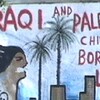
UN nuclear inspector El Baradei to visit Israel in July
29 April 2004
IAEA Director General ElBaradei will be visiting Israel sometime in the summer, though details have not been finalized. Israel, which has refused to sign the nuclear Non-Proliferation Treaty and is believed to have up to 200 nuclear weapons, is a Member State of the IAEA and it is six years since he was last there. He would intend to use such a trip to promote non-proliferation and a nuclear weapon-free zone in the Middle East, as well as to discuss bilateral cooperation in nuclear sciences and applications. Read more about UN nuclear inspector El Baradei to visit Israel in July








